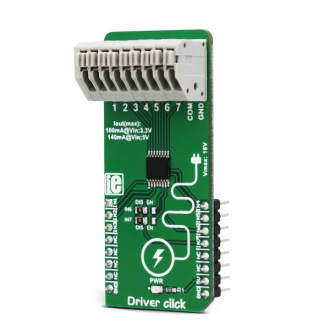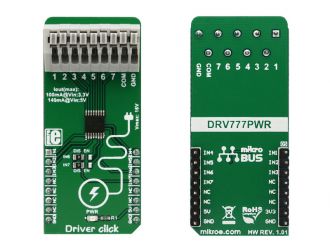
We strongly encourage users to use Package manager for sharing their code on Libstock website, because it boosts your efficiency and leaves the end user with no room for error. [more info]

Rating:
Author: MIKROE
Last Updated: 2018-08-07
Package Version: 1.0.0.0
mikroSDK Library: 1.0.0.0
Category: Stepper
Downloaded: 5174 times
Not followed.
License: MIT license
Driver click features an IC with seven integrated high-current sink drivers drivers, which can be used to drive a wide range of loads via simple parallel interface.
Do you want to subscribe in order to receive notifications regarding "Driver click" changes.
Do you want to unsubscribe in order to stop receiving notifications regarding "Driver click" changes.
Do you want to report abuse regarding "Driver click".


Library Description
Library performs the control of the output pins (OUT1 - OUT7) by setting input pins (IN1 - IN7).
For more details check the documentation.
Key functions :
void driver_setIN1( uint8_t state ) - Function determines state of output 1 (OUT1).Example description
The application is composed of three sections :
void applicationTask()
{
temp = 1;
for (count = 0; count < 7; count++)
{
switch (selectIN & temp)
{
case 0x01 :
{
driver_setIN1( enableIN );
Delay_ms( pulseWidth );
driver_setIN1( disableIN );
break;
}
case 0x02 :
{
driver_setIN2( enableIN );
Delay_ms( pulseWidth );
driver_setIN2( disableIN );
break;
}
case 0x04 :
{
driver_setIN3( enableIN );
Delay_ms( pulseWidth );
driver_setIN3( disableIN );
break;
}
case 0x08 :
{
driver_setIN4( enableIN );
Delay_ms( pulseWidth );
driver_setIN4( disableIN );
break;
}
case 0x10 :
{
driver_setIN5( enableIN );
Delay_ms( pulseWidth );
driver_setIN5( disableIN );
break;
}
case 0x20 :
{
driver_setIN6( enableIN );
Delay_ms( pulseWidth );
driver_setIN6( disableIN );
break;
}
case 0x40 :
{
driver_setIN7( enableIN );
Delay_ms( pulseWidth );
driver_setIN7( disableIN );
break;
}
default :
{
break;
}
}
temp <<= 1;
}
}
Additional notes and information
Depending on the development board you are using, you may need USB UART click, USB UART 2 click or RS232 click to connect to your PC, for development systems with no UART to USB interface available on the board. The terminal available in all MikroElektronika compilers, or any other terminal application of your choice, can be used to read the message.